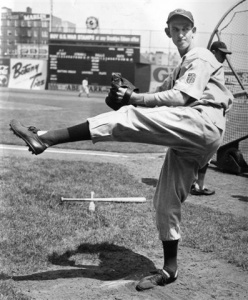By Phil Ellenbecker
The Chicago White Sox came in with a whimper and went out with a bang May 16, 1953, at Yankee Stadium.
The White Sox and New York Yankees played many memorable games during the 1950s, but perhaps none more memorable, at least on the improbability scale, than what transpired on that Saturday afternoon before 22,966 at The House That Ruth Built. Thanks to Tommy Byrne.
Byrne, a pitcher who grew up idolizing Babe Ruth in The Bambino's hometown of Baltimore and who pitched 11 seasons with the Yankees, struck a blow for the invaders by belting a pinch-hit grand slam homer in the top of the ninth inning that gave the Chicagos, as Yankees manager Casey Stengel used to called them, a 5-3 victory.
Byrne's slam, one of 14 homers he hit in his 13-year career, capped a comeback from a 3-0 deficit entering the ninth.
It certainly didn't start that way for the Pale Hose. Yankees right-hander Vic Raschi retired the first 12 White Sox he faced, 17 of the first 18, and Chicago went 18 up and 18 down in the first six innings, as Raschi coaxed a double play after giving up his first hit in the sixth, an infield single by Jim Rivera.
But the Yankees weren't faring much better against Billy Pierce. The Chisox southpaw held the Yankees to four hits and no runs, striking out seven with one walk, through six innings.
New York finally broke the 0-0 deadlock with two runs in the seventh on RBI singles by pinch hitter Johnny Mize and Raschi. The Yankees made it 3-0 in the eighth on a sacrifice fly by Gil McDougald off Luis Aloma, who'd just come on after Pierce walked Hank Bauer and yielded a single to Mickey Mantle, Bauer moving to third, leading off the inning.
Bud Sheely, batting for Aloma, started the White Sox on the comeback trail with a single to right field leading off the ninth. After a ground out by Nellie Fox advanced pinch runner Fred Marsh to second, Ferris Fain walked and Minnie Minoso's grounder forced out Fain, Marsh going to third.
Tom Wright singled in Marsh and broke up Raschi's shutout. The bases were loaded after a walk to Rivera, bringing in Ewell "The Whip" Blackwell, a six-time All-Star with the Cincinnati Reds winding up his 10-year
career with the Yankees. He was so nicknamed because of his side-arm delivery emerging from a 6-foot-6, 195-pound frame.
And out of the White Sox dugout swinging a bat came Byrne, a capable enough hitter (.238 lifetime average) that early in his career the hard-throwing but wild lefty, still trying to establish himself, was asked by Yankees manager Joe McCarthy to consider moving to first base.
Chicago manager Paul Richards, known for his shrewdness, was playing a hunch.
“Richards asked me, ‘You ever hit this guy?’" Byrne recalled in his Society for American Baseball Research biography. ‘Yeah,’ I said, ‘about 11 years ago.’ ‘Well,’ said Richards, ‘How about going up and hitting one out of here?’ So I go up there and, after getting the count to 2-2, I don’t even remember swinging the bat, but I hit a line drive, 20 rows back in right field.”
So Minoso, Wright and Rivera crossed the plate in front of Byrne, after Tommy's first and last homer of 1953, and all of a sudden Chicago led 5-3.
Fritz Dorish came on for the White Sox in the bottom of the ninth and gave up a leadoff single to pinch hitter Gene Woodling. But pinch hitter Joe Collins looked at a third strike, Don Bollweg flied out to center and Bauer lined out to center.
And the Yankees, on their way to a record fifth straight World Series title in 1953, were vanquished.
The win left the White Sox a half-game behind the Yankees in second place in the American League.
But the Pale Hose, as in so many seasons during the decade, couldn't keep up with the Yanks and eventually finished third behind New York and Cleveland, 11 1/2 games back. The White Sox went 9-13 that season against the Yankees.
Aloma picked up the win on that May 16 in his first decision in a year in which he went 2-0 with a 4.70 ERA. Raschi dropped to 2-3 and would finish 13-3 with a 3.33 ERA.
Pierce went 18-12 with a 2.72 ERA that year and led the AL in strikeouts with 186. He holds the White Sox franchise record for career strikeouts (1,796), and his club marks of 186 wins, 2,931 innings and 390 starts are team records for a left-hander.
Byrne's game-winning pinch-hit grand slam definitely qualifies as the highlight of his one-year tenure with the White Sox, which lasted all of six games and 16 innings in which he somehow managed a 2-0 record with a 10.12 ERA. Likewise his short stints with the St. Louis Browns and Washington Senators were rather pedestrian. It was with the Yankees in New York, where he bookended his career, that he managed his most success, with a record of 72-40 and a 3.93 ERA, including a 1-1 mark with a 2.53 ERA in 21 innings of World Series action, one All-Star Game selection (but no appearance) and a 14th place in AL MVP voting in 1955.
After his career, in which he finished 85-69 with a 4.11 ERA, Byrne had notable success as a businessman and politician, including two terms as mayor in his adopted hometown of Wake Forest, North Carolina.
But when it comes to tell-your-grandkids moments, I'd have to think the time when Paul Richards summoned Tommy to swing that lumber back on May 13, 1953, is the one that would roll off the tongue most readily.
Sources:
Statistics and biographical information: https://sabr.org/bioproj/


No comments:
Post a Comment